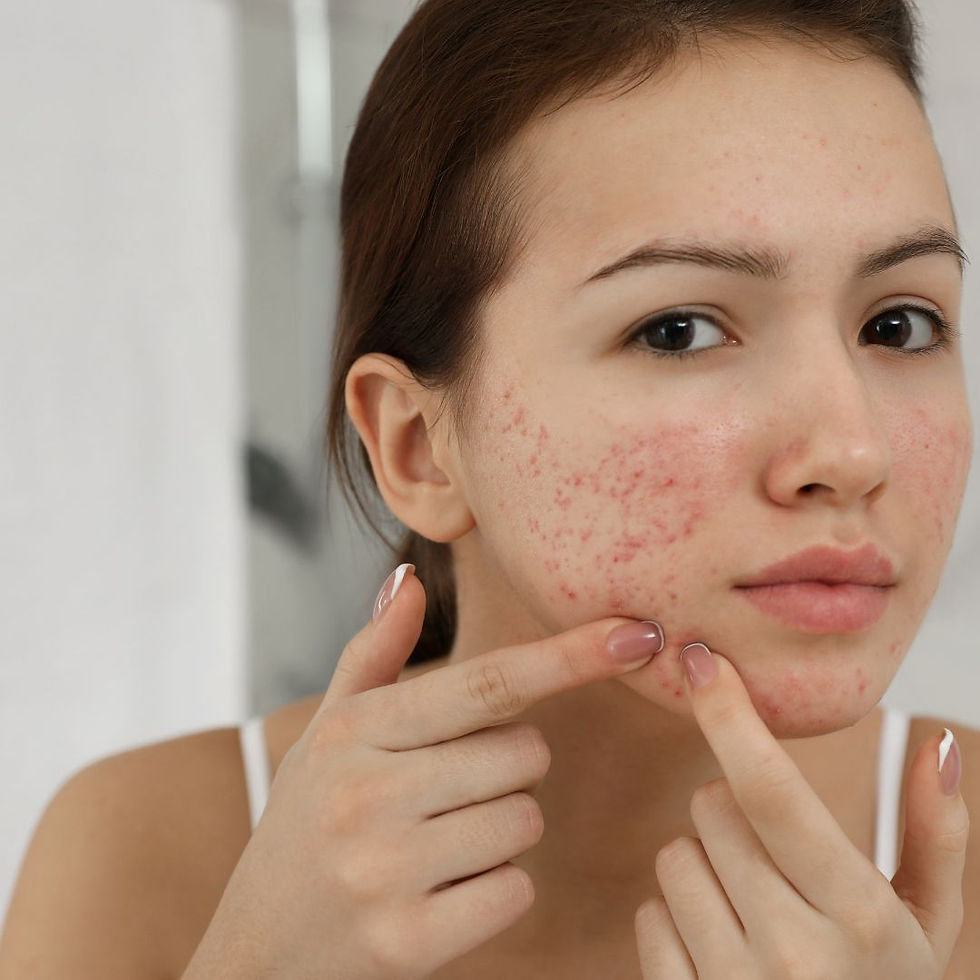The Untapped Potential of CBD for Skin Conditions: What Skincare Practitioners Need to Know!
- kathywalton
- May 18, 2023
- 9 min read

The world of skincare is constantly evolving, with new ingredients and formulations emerging to help us achieve a healthy, youthful complexion. One ingredient that has recently gained significant attention in the skincare industry is cannabidiol (CBD). Extracted from the hemp plant, CBD has demonstrated remarkable potential in skincare products due to its numerous therapeutic properties. If you haven't yet incorporated CBD into your skincare routine, here's why you should consider doing so.
The skin is a vital organ that serves as the body's first defense against harmful effects from the external environment. Not only does it provide protection, but it also plays a significant role in various responses, such as immune, neurologic and endocrine functions. The complex process that maintains the skin's balance is essential to sustain skin's homeostasis. In this blog, we will delve into the untapped potential of CBD for skin conditions: What Skincare Practitioners Need to Know by highlighting clinical studies supporting the use of CBD for skin conditions and discussing why dermatologists, doctors, and medspa owners should consider incorporating CBD into their skincare practice.

What is CBD?
Cannabidiol (CBD) is a non-psychoactive compound found in the Cannabis sativa plant. Unlike THC, the compound responsible for the "high" associated with marijuana use, CBD does not induce any psychoactive effects. Instead, it has been recognized for its potential health benefits, including anti-inflammatory, antioxidant, and pain-relieving properties.
CBD in Skincare: The Benefits
1. Anti-inflammatory Properties
One of the primary reasons CBD has become a popular skincare ingredient is its anti-inflammatory properties. Inflammation is a common cause of various skin conditions such as acne, rosacea, and eczema. By reducing inflammation, CBD can help soothe irritated skin, making it an ideal addition to skincare products targeting these issues.
2. Antioxidant Effects
CBD also possesses powerful antioxidant properties, which can help protect the skin from environmental stressors such as pollution and UV radiation. These stressors can lead to premature aging, fine lines, and wrinkles. By neutralizing free radicals, CBD can help slow down the aging process, promoting a more youthful appearance.
3. Hydration and Moisturization
Many CBD-infused skincare products contain additional nourishing ingredients, such as essential fatty acids and vitamins. These ingredients work together with CBD to provide deep hydration and moisturization, helping to maintain a healthy skin barrier and prevent dryness.
4. Regulation of Oil Production
CBD has been shown to have a balancing effect on sebum production, the oil produced by our skin. Excess sebum can lead to breakouts and acne, while too little can result in dry, flaky skin. By regulating oil production, CBD can help maintain an optimal balance, promoting healthy, clear skin.

Recent findings suggest that the skin has its endocannabinoid system (ECS). This system controls the skin’s maintenance and barrier function. Disruptions in the ECS can lead to various skin conditions, such as acne, pruritus, and dermatitis.
The science behind CBD and its role in helping combat aging skin:
CBD has antimicrobial properties and can mitigate inflammation. Ultraviolet (UV) light exposure has been linked to skin photoaging, a process that involves inflammation and pro-inflammatory cytokine production. CBD can inhibit tumor necrosis factor alpha (TNFα) released during exposure to UVB, which leads to dry skin. UVA is known to cause skin photoaging by breaking down collagen types I, II, and III. CBG significantly reduces interleukin-6 (IL-6) production, while CBD shows only a maximum inhibition of 27%, without reaching significance.

The Science Behind CBD's Effectiveness in Treating Acne
Acne is a prevalent condition in the US, affecting nearly 50 million people. As a widespread disease that affects most people at some point in their life, acne can cause significant irritation, scarring of the skin, and emotional distress. Conventional treatments often present potential adverse side effects and increasing antibiotic resistance, highlighting the need for new, natural, and safe acne therapies. One such promising treatment is Cannabidiol (CBD).
A study evaluating the effects of CBD on human sebaceous glands demonstrated its potential in treating acne. The research found that CBD dose-dependently inhibited excessive lipid synthesis in sebocyte cultures pre-treated with pro-acne inducing inflammatory compounds. Additionally, the anti-inflammatory effects of CBD were observed in the reduction of inflammatory cytokine TNF-α.
In another study, hemp seed hexane extracts (HSHE) were evaluated for their potential anti-acne effects. Like CBD, hemp seed extracts do not exhibit psychotropic properties and are suggested to have potential anti-inflammatory effects. Results showed that HSHE reduced C. acnes-induced inflammation in human keratinocytes through down-regulation of pro-inflammatory cytokines IL-1β and IL-8. Furthermore, HSHE significantly inhibited the overproduction of inflammatory radical nitric oxide in the same cells. A human study evaluating the safety and efficacy of cannabis seed extracts for acne found that 3% cannabis seed extracts reduced inflammation-induced redness of the skin, known as erythema. The application of 3% cannabis seeds extract cream was found to be safe, well tolerated, non-allergenic, and non-irritating.
Why Dermatologists, Doctors, and Medspa Owners Should Consider CBD for Acne Treatment CBD has been widely studied in various inflammatory and immunological disorders, setting a precedent for investigation in other inflammatory conditions, such as acne. The pharmacodynamics of CBD reveals modulation of critical inflammatory and immunological pathways and receptors, leading to a decrease in inflammation and subsequent cytokine production. This supports the anti-inflammatory effects of CBD, making it a promising adjuvant anti-inflammatory treatment for acne. Hemp seed extracts, like CBD, also show potential as natural, safe, and effective anti-inflammatory therapies for acne. These extracts have been shown to reduce inflammation and protect cells from overproduction of inflammatory radicals and nitric oxides.
Given the complex and multifactorial nature of acne, there is a need for large-scale human studies to understand the impact of CBD on acne at the clinical level. Additionally, future studies may optimize the concentration and delivery of CBD for acne treatment. Nonetheless, the existing research strongly supports the use of CBD in treating acne, making it an option that dermatologists, doctors, and medspa owners should seriously consider incorporating into their practice.
How to Use CBD in Your Skincare Routine

Integrating CBD into your skincare routine is easy, as there are numerous products available on the market, including cleansers, moisturizers, serums, and even facial masks. To ensure you're getting the most out of your CBD-infused skincare products, follow these tips:
~Choose high-quality products: Opt for products that use medical grade, full-spectrum CBD oil, moisturizer, and/or toner which contains a range of beneficial compounds, such as terpenes and flavonoids, that work synergistically with CBD.
Apply consistently: Like any skincare ingredient, consistent use is key to achieving the desired results. Incorporate CBD-infused products into your daily routine and give your skin time to adjust and experience the benefits.
Combine with complementary ingredients: Look for products that combine CBD with other skin-loving ingredients, such as hyaluronic acid, niacinamide, or peptides, to enhance the overall efficacy of your skincare routine.

In conclusion, CBD's numerous benefits make it a valuable addition to any skincare routine. Its anti-inflammatory, antioxidant, and balancing properties can help address various skin concerns, promoting a healthy, radiant complexion. If you haven't tried CBD in your skincare regimen yet, now is the perfect time to discover its potential and enjoy the benefits it offers. CBD offers promising potential as an adjuvant anti-inflammatory treatment for acne. By staying informed about the latest research and considering the integration of CBD into their practice, dermatologists, doctors, and medspa owners can provide patients with a natural, safe, and effective acne treatment option.
Interested in starting your own medical grade skincare line with or without CBD? Click on link below to learn how easy it is to brand your own skincare line!
References:
1. Tan JK, Bhate K. A global perspective on the epidemiology of acne. Br J Dermatol. 2015;172(Suppl 1):3–12. doi: 10.1111/bjd.13462 [PubMed] [CrossRef] [Google Scholar] 2. Cordain L, Lindeberg S, Hurtado M, et al. Acne vulgaris: a disease of Western civilization. Arch Dermatol. 2002;138(12):1584–1590. doi: 10.1001/archderm.138.12.1584 [PubMed] [CrossRef] [Google Scholar] 3. Titus S, Hodge J. Diagnosis and treatment of acne. Am Fam Physician. 2012;86(8):734–740. [PubMed] [Google Scholar] 4. Dunn LK, O’Neill JL, Feldman SR. Acne in adolescents: quality of life, self-esteem, mood, and psychological disorders. Dermatol Online J. 2011;17(1):1. [PubMed] [Google Scholar] 5. Habeshian KA, Cohen BA. Current issues in the treatment of acne vulgaris. Pediatrics. 2020;145(Suppl 2):S225–S230. doi: 10.1542/peds.2019-2056L [PubMed] [CrossRef] [Google Scholar] 6. Castillo DE, Nanda S, Keri JE. Propionibacterium (cutibacterium) acnes bacteriophage therapy in acne: current evidence and future perspectives. Dermatol Ther. 2019;9(1):19–31. doi: 10.1007/s13555-018-0275-9 [PMC free article] [PubMed] [CrossRef] [Google Scholar] 7. Dreno B, Pécastaings S, Corvec S, et al. Cutibacterium acnes (Propionibacterium acnes) and acne vulgaris: a brief look at the latest updates. J Eur Acad Dermatol Venereol. 2018;32(Suppl 2):5–14. doi: 10.1111/jdv.15043 [PubMed] [CrossRef] [Google Scholar] 8. Zaenglein AL, Pathy AL, Schlosser BJ, et al. Guidelines of care for the management of acne vulgaris. J Am Acad Dermatol. 2016;74(5):945–73 e33. doi: 10.1016/j.jaad.2015.12.037 [PubMed] [CrossRef] [Google Scholar] 9. Martel JL, Miao JH, Badri T. Anatomy, Hair Follicle. Treasure Island (FL): StatPearls; 2021. [Google Scholar] 10. Gollnick H, Cunliffe W, Berson D, et al. Management of acne: a report from a global alliance to improve outcomes in acne. J Am Acad Dermatol. 2003;49(1 Suppl):S1–S37. doi: 10.1067/mjd.2003.618 [PubMed] [CrossRef] [Google Scholar] 11. Dreno B. What is new in the pathophysiology of acne, an overview. J Eur Acad Dermatol Venereol. 2017;31(Suppl 5):8–12. doi: 10.1111/jdv.14374 [PubMed] [CrossRef] [Google Scholar] 12. Fox L, Csongradi C, Aucamp M, et al. Treatment modalities for acne. Molecules. 2016;21(8):1063. doi: 10.3390/molecules21081063 [PMC free article] [PubMed] [CrossRef] [Google Scholar] 13. Thiboutot DM. The role of follicular hyperkeratinization in acne. J Dermatol Treat. 2000;11(2):S5–S8. doi: 10.1080/095466300750163645 [CrossRef] [Google Scholar] 14. Platsidaki E, Dessinioti C. Recent advances in understanding Propionibacterium acnes (Cutibacterium acnes) in acne. F1000Res. 2018;7:1953. doi: 10.12688/f1000research.15659.1 [PMC free article] [PubMed] [CrossRef] [Google Scholar] 15. Kurokawa I, Danby FW, Ju Q, et al. New developments in our understanding of acne pathogenesis and treatment. Exp Dermatol. 2009;18(10):821–832. doi: 10.1111/j.1600-0625.2009.00890.x [PubMed] [CrossRef] [Google Scholar] 16. Akamatsu H, Horio T, Hattori K. Increased hydrogen peroxide generation by neutrophils from patients with acne inflammation. Int J Dermatol. 2003;42(5):366–369. doi: 10.1046/j.1365-4362.2003.01540.x [PubMed] [CrossRef] [Google Scholar] 17. Sutaria AH, Masood S, Schlessinger J. Acne Vulgaris. Treasure Island (FL): StatPearls; 2021. [Google Scholar] 18. Layton A. The use of isotretinoin in acne. Dermatoendocrinol. 2009;1(3):162–169. doi: 10.4161/derm.1.3.9364 [PMC free article] [PubMed] [CrossRef] [Google Scholar] 19. Moradi Tuchayi S, Alexander T, Nadkarni A, et al. Interventions to increase adherence to acne treatment. Patient Prefer Adherence. 2016;10:2091–2096. doi: 10.2147/PPA.S117437 [PMC free article] [PubMed] [CrossRef] [Google Scholar] 20. Olah A, Tóth BI, Borbíró I, et al. Cannabidiol exerts sebostatic and antiinflammatory effects on human sebocytes. J Clin Invest. 2014;124(9):3713–3724. doi: 10.1172/JCI64628 [PMC free article] [PubMed] [CrossRef] [Google Scholar] 21. Atalay S, Jarocka-Karpowicz I, Skrzydlewska E. Antioxidative and anti-inflammatory properties of cannabidiol. Antioxidants. 2019;9(1):21. doi: 10.3390/antiox9010021 [PMC free article] [PubMed] [CrossRef] [Google Scholar] 22. Nagarkatti P, Pandey R, Rieder SA, et al. Cannabinoids as novel anti-inflammatory drugs. Future Med Chem. 2009;1(7):1333–1349. doi: 10.4155/fmc.09.93 [PMC free article] [PubMed] [CrossRef] [Google Scholar] 23. Peyravian N, Deo S, Daunert S, et al. Cannabidiol as a novel therapeutic for immune modulation. Immunotargets Ther. 2020;9:131–140. doi: 10.2147/ITT.S263690 [PMC free article] [PubMed] [CrossRef] [Google Scholar] 24. Costa B, Giagnoni G, Franke C, Trovato AE, Colleoni M. Vanilloid TRPV1 receptor mediates the antihyperalgesic effect of the nonpsychoactive cannabinoid, cannabidiol, in a rat model of acute inflammation. Br J Pharmacol. 2004;143(2):247–250. doi: 10.1038/sj.bjp.0705920 [PMC free article] [PubMed] [CrossRef] [Google Scholar] 25. Fonseca BM, Correia-da-silva G, Teixeira NA. Cannabinoid-induced cell death in endometrial cancer cells: involvement of TRPV1 receptors in apoptosis. J Physiol Biochem. 2018;74(2):261–272. doi: 10.1007/s13105-018-0611-7 [PubMed] [CrossRef] [Google Scholar] 26. Malfait AM, Gallily R, Sumariwalla PF, et al. The nonpsychoactive cannabis constituent cannabidiol is an oral anti-arthritic therapeutic in murine collagen-induced arthritis. Proc Natl Acad Sci U S A. 2000;97(17):9561–9566. doi: 10.1073/pnas.160105897 [PMC free article] [PubMed] [CrossRef] [Google Scholar] 27. Kozela E, Pietr M, Juknat A, Rimmerman N, Levy R, Vogel Z. Cannabinoids Delta(9)-tetrahydrocannabinol and cannabidiol differentially inhibit the lipopolysaccharide-activated NF-kappaB and interferon-beta/STAT proinflammatory pathways in BV-2 microglial cells. J Biol Chem. 2010;285(3):1616–1626. doi: 10.1074/jbc.M109.069294 [PMC free article] [PubMed] [CrossRef] [Google Scholar] 28. Weiss L, Zeira M, Reich S, et al. Cannabidiol lowers incidence of diabetes in non-obese diabetic mice. Autoimmunity. 2006;39(2):143–151. doi: 10.1080/08916930500356674 [PubMed] [CrossRef] [Google Scholar] 29. Liu C, Ma H, Slitt AL, Seeram NP. Inhibitory effect of cannabidiol on the activation of NLRP3 Inflammasome is associated with its modulation of the P2X7 receptor in human monocytes. J Nat Prod. 2020;83(6):2025–2029. doi: 10.1021/acs.jnatprod.0c00138 [PubMed] [CrossRef] [Google Scholar] 30. Libro R, Scionti D, Diomede F, et al. Cannabidiol modulates the immunophenotype and inhibits the activation of the inflammasome in human gingival mesenchymal stem cells. Front Physiol. 2016;7:559. doi: 10.3389/fphys.2016.00559 [PMC free article] [PubMed] [CrossRef] [Google Scholar] 31. de Almeida DL, Devi LA. Diversity of molecular targets and signaling pathways for CBD. Pharmacol Res Perspect. 2020;8(6):e00682. doi: 10.1002/prp2.682 [PMC free article] [PubMed] [CrossRef] [Google Scholar] 32. Carrier EJ, Auchampach JA, Hillard CJ. Inhibition of an equilibrative nucleoside transporter by cannabidiol: a mechanism of cannabinoid immunosuppression. Proc Natl Acad Sci U S A. 2006;103(20):7895–7900. doi: 10.1073/pnas.0511232103 [PMC free article] [PubMed] [CrossRef] [Google Scholar] 33. Liou GI, Auchampach JA, Hillard CJ, et al. Mediation of cannabidiol anti-inflammation in the retina by equilibrative nucleoside transporter and A2A adenosine receptor. Invest Ophthalmol Vis Sci. 2008;49(12):5526–5531. doi: 10.1167/iovs.08-2196 [PMC free article] [PubMed] [CrossRef] [Google Scholar] 34. Hasko G, Cronstein BN. Adenosine: an endogenous regulator of innate immunity. Trends Immunol. 2004;25(1):33–39. doi: 10.1016/j.it.2003.11.003 [PubMed] [CrossRef] [Google Scholar] 35. Mecha M, Feliú A, Iñigo PM, et al. Cannabidiol provides long-lasting protection against the deleterious effects of inflammation in a viral model of multiple sclerosis: a role for A2A receptors. Neurobiol Dis. 2013;59:141–150. doi: 10.1016/j.nbd.2013.06.016 [PubMed] [CrossRef] [Google Scholar] 36. Gottlieb JF, Benedetti F, Geoffroy PA, et al. The chronotherapeutic treatment of bipolar disorders: a systematic review and practice recommendations from the ISBD task force on chronotherapy and chronobiology. Bipolar Disord. 2019;21(8):741–773. doi: 10.1111/bdi.12847 [PubMed] [CrossRef] [Google Scholar] 37. Jin S, Lee MY, Chen W. The ameliorative effect of hemp seed hexane extracts on the Propionibacterium acnes-induced inflammation and lipogenesis in sebocytes. PLoS One. 2018;13(8):e0202933. doi: 10.1371/journal.pone.0202933 [PMC free article] [PubMed] [CrossRef] [Google Scholar] 38. Ali A, Akhtar N. The safety and efficacy of 3% Cannabis seeds extract cream for reduction of human cheek skin sebum and erythema content. Pak J Pharm Sci. 2015;28(4):1389–1395. [PubMed] [Google Scholar] 39. Olah A, Markovics A, Szabó-Papp J, et al. Differential effectiveness of selected non-psychotropic phytocannabinoids on human sebocyte functions implicates their introduction in dry/seborrhoeic skin and acne treatment. Exp Dermatol. 2016;25(9):701–707. doi: 10.1111/exd.13042 [PubMed] [CrossRef] [Google Scholar] 40. Baswan SM, Klosner AE, Glynn K, et al. Therapeutic Potential of Cannabidiol (CBD) for skin health and disorders. Clin Cosmet Investig Dermatol. 2020;13:927–942. doi: 10.2147/CCID.S286411 [PMC free article] [PubMed] [CrossRef] [Google Scholar]








Comments